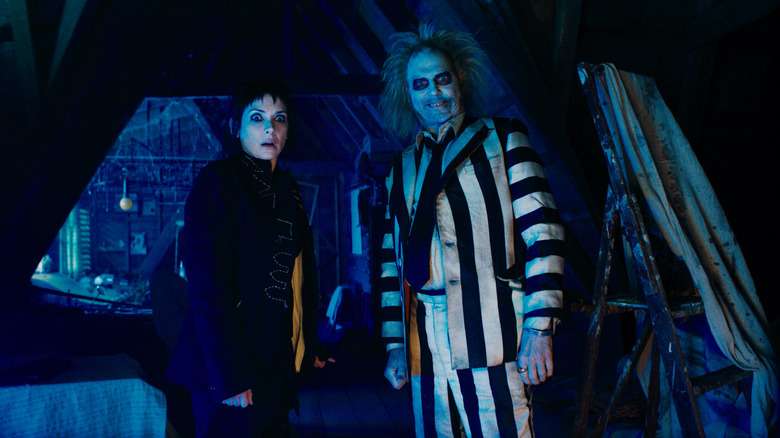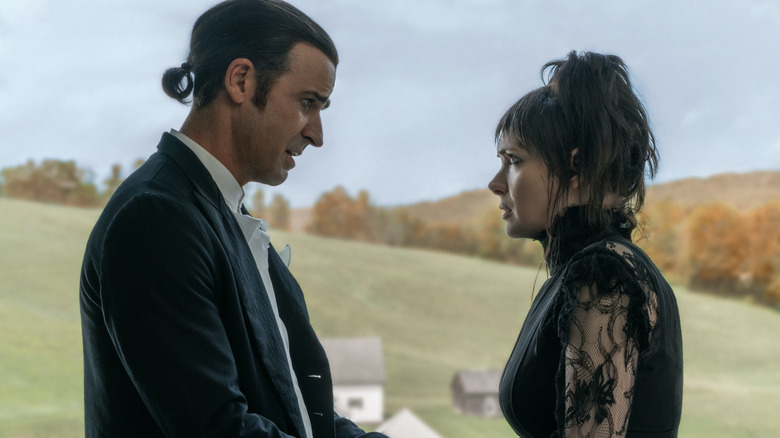Tim Burton has always made films about “himself” in the sense that his movies are all about odd eccentrics or outsiders that he clearly relates to. As he’s gotten older, however, his best movies have also not-so-coincidentally touched upon what happens to people like that as they age. “Big Fish,” for example, is about a whimsical storyteller whose once-adoring son, having grown up hearing his dad’s tall tales over and over, now finds him more infuriating than charming. Similarly, Burton’s Margaret Keane biopic “Big Eyes” is about a quirky artist who, having long since settled down and started a family, comes to realize she’s no longer content letting her husband take the credit for her work like when she was younger.
That bodes well for “Beetlejuice Beetlejuice,” a legacy sequel that Burton himself would tell you was heavily informed by his own real-life experiences in the nearly 40 years since his original 1988 classic hit theaters. Winona Ryder’s iconic goth weirdo Lydia Deetz was arguably Burton’s first true onscreen avatar when she made her debut in that movie, yearning for nothing more than to dress entirely in black and hang out with the dead (à la a teen Burton chilling by himself at the local cemetery in his home city of Burbank). By the time “Beetlejuice Beetlejuice” begins, though, Lydia appears to be living a far more conventional life, complete with a daughter named Astrid (Jenna Ortega), a romantic partner named Rory (Justin Theroux), and a job as a television personality (the “Beetlejuice Beetlejuice” trailer shows her performing for her show by asking: “The living. The dead. Can they coexist?”).
Would teen Lydia feel betrayed, knowing her older self had become such a normie? (Relatively speaking, that is; the Deetzes’ version of “normal” is not like other families’, which was the very basis of the conflict in the original “Beetlejuice.”) Interviewing her at the “Beetlejuice Beetlejuice” junket, /Film’s Jacob Hall got a chance to ask Ryder that very question.
Older Lydia is still a Tim Burton avatar
There’s a reason Hollywood can’t stop, won’t stop making movies about young people being magically transformed into adults, traveling back in time to meet their parents when they were teenagers, or body-swapping with a grownup in their life. (Here’s looking forward to “Freakier Friday!”) For the youths, it’s a way of showing them that adult life is more complicated than they realize and it’s important to take advantage of the opportunities afforded to them while they still can. For everyone else, it’s a reminder that everybody’s goals are in constant flux — but while your dreams of becoming an archaeologist ballerina astronaut might’ve been aiming a little too high, some of your other youthful aspirations may be worth revisiting, lest your childhood self be disappointed in what you’ve become.
In Lydia’s case, Ryder admitted to /Film, “I think certainly, I never pictured Lydia either having children or in any type of relationship. I just always thought she was just probably in her own world as she got older. Just sort of in the attic and happy, but alone.” This also made it tricky for Ryder when she found out about the character’s TV career, which “was hard to imagine. But I think once we got there and once Jenna and I bonded and once Justin came on board […] I mean, I think everyone who’s as old as I am now, we’ve all been in those things where you’re just like, ‘What was I thinking, in terms of the relationship I have?’ But I don’t know what young Lydia, I don’t think she would ever have expected to be in front of a camera.”
Lydia finding a way to actually make money based on her macabre interests only further invites comparisons between her and Burton, who’s also managed to use his gloomy fixations as the springboard for a successful artistic career. Perhaps the real question is: Will those who grew up adoring young Lydia approve of what Burton has done with her in the “Beetlejuice” sequel? All shall be revealed when the juice is set loose on September 6, 2024.









